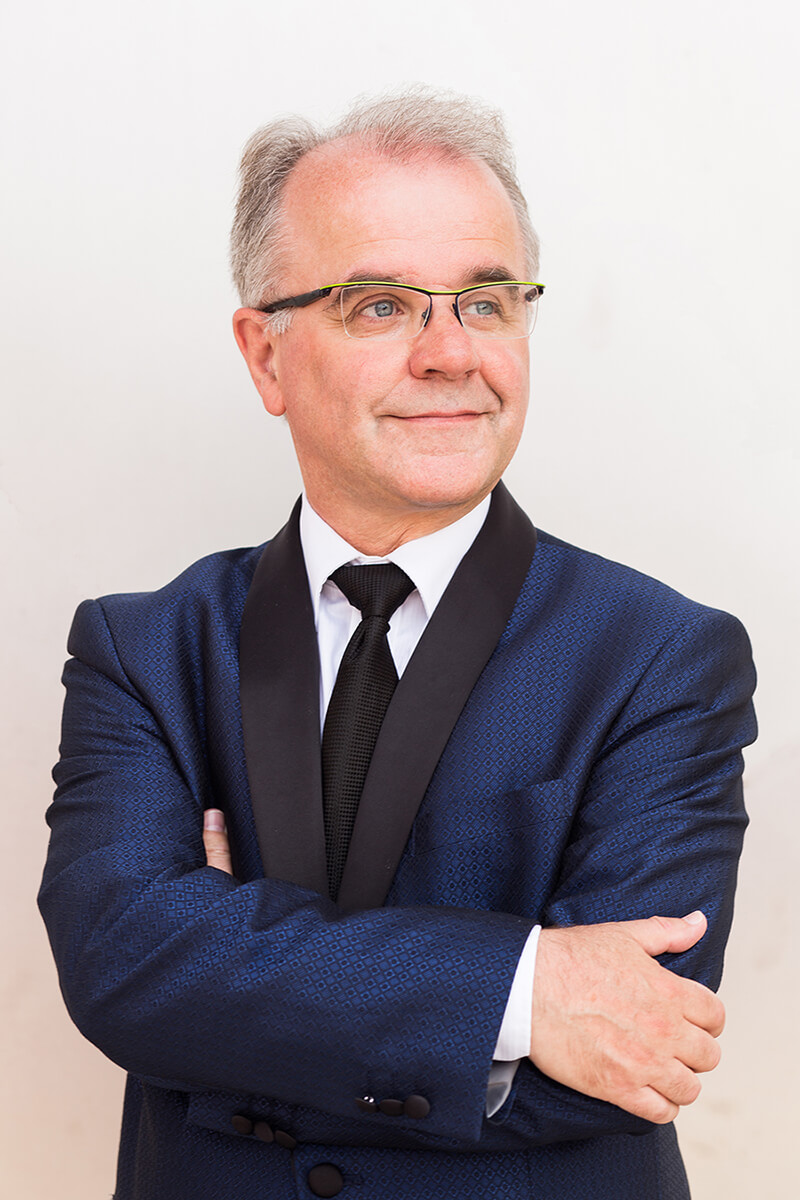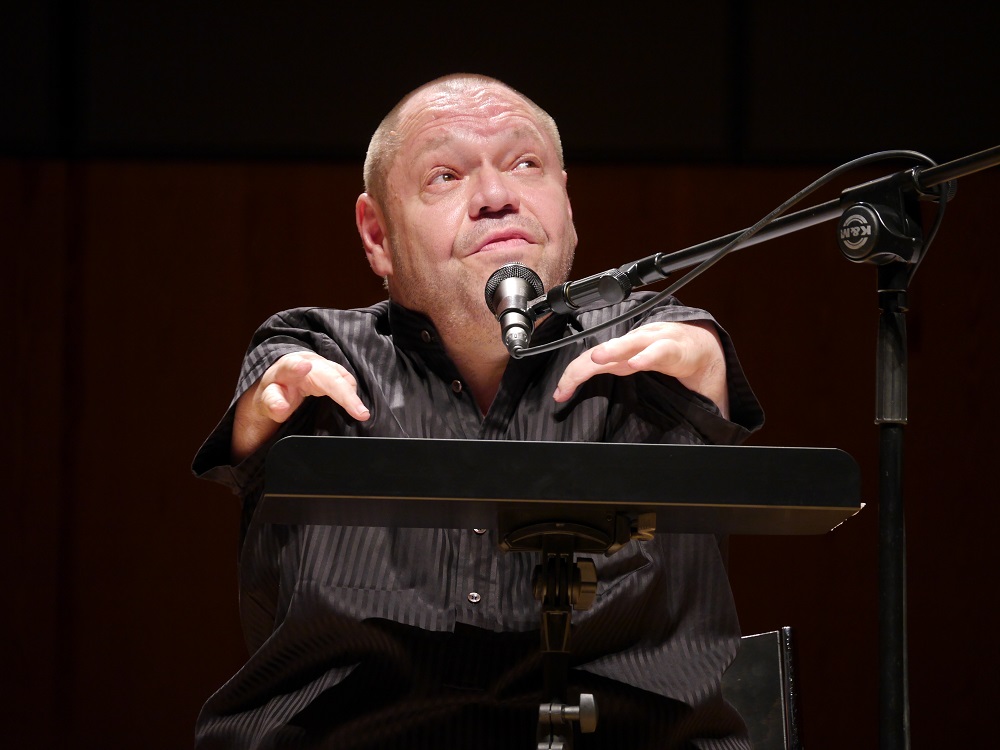National Youth Choir of Scotland, RSNO, Bell / Quasthoff, Amatis Trio, Edinburgh International Festival 2023 review - from the heights to the depths | reviews, news & interviews
National Youth Choir of Scotland, RSNO, Bell / Quasthoff, Amatis Trio, Edinburgh International Festival 2023 review - from the heights to the depths
National Youth Choir of Scotland, RSNO, Bell / Quasthoff, Amatis Trio, Edinburgh International Festival 2023 review - from the heights to the depths
Heavenly young voices, too much talking from a former bass-baritone

The National Youth Choir of Scotland have the most easily pronounceable acronym in Scottish music: everyone up here knows who you’re talking about when you mention NYCOS.
They’ve been going from strength to strength under their Artistic Director, Christopher Bell, and their Edinburgh International Festival concert with the Royal Scottish National Orchestra (★★★★★) showcased two very different sides of their considerable skills.
The first thing you noticed in their performance of Britten’s Rejoice in the Lamb was the clarity of their articulation of what is a very chewy text, but they turned this to their advantage in the impressive linear crescendo of the opening, before playfully turning over all the different elements of creation that were rejoicing in turn. A touch of angst entered their sound during the passage about hardships, before an ending of brilliant brightness, with focused Hallelujahs bringing out the ringing beauty of their sopranos.
 From Britten’s clear sunshine the young singers then showed themselves to be equally comfortable in the dusky half-light of Duruflé’s Requiem, with its diaphanous textures and rippling word-painting. Here the choir’s sound was soft and warm while retaining its clarity, demonstrated most clearly in the Offertory with its sharply focused alto opening, leading into the urgent, unison drama of the judgement scenes, before ethereal sopranos hailed redemption. Bell (pictured left) conducted the music sympathetically, achieving the right balance of choir and orchestra even in the high drama of the Sanctus and Libera Me. The RSNO responded with just the right level of punch.
From Britten’s clear sunshine the young singers then showed themselves to be equally comfortable in the dusky half-light of Duruflé’s Requiem, with its diaphanous textures and rippling word-painting. Here the choir’s sound was soft and warm while retaining its clarity, demonstrated most clearly in the Offertory with its sharply focused alto opening, leading into the urgent, unison drama of the judgement scenes, before ethereal sopranos hailed redemption. Bell (pictured left) conducted the music sympathetically, achieving the right balance of choir and orchestra even in the high drama of the Sanctus and Libera Me. The RSNO responded with just the right level of punch.
This is a work of meditative interior textures, more about violas and cellos than violins and brass, and they summoned up some beautiful sound painting to match the choir, nowhere more so than in the gorgeous effect with harp and celesta in the final In Paradisum. Paul Grant’s declamatory baritone and Catriona Morison’s lustrous mezzo-soprano only enhanced the beauty of both drama and sound. Intermittently through the piece, a small child was dancing in the aisle of the stalls, and who could blame her?
There was a singer but no singing in the Queen’s Hall the following morning. Thomas Quasthoff (pictured below) has retired from singing baritone, but he has been pressed into service as a narrator in several recent Edinburgh Festivals, most recently in Saturday evening’s Magic Flute. He was the reader for Monday’s concert with the Amatis Trio, a programme on the theme of Humanity in War, with a sequence of music interspersed with letters and diary entries, mostly from soldiers who served in the trenches of the First World War (★★★).  I’m a big fan of intelligently curated programmes along these lines, but they’re dashed hard to pull off, and this one faltered on several fronts. The central one was that the connection between the words and the music often seemed rather arbitrary. A diary entry about the Russians was followed by some Shostakovich, a letter from the Suffragette Union was followed by (admittedly delightful) music by a German-American female composer. The connection was always there if you looked hard enough, but it often seemed a little laboured and not especially natural.
I’m a big fan of intelligently curated programmes along these lines, but they’re dashed hard to pull off, and this one faltered on several fronts. The central one was that the connection between the words and the music often seemed rather arbitrary. A diary entry about the Russians was followed by some Shostakovich, a letter from the Suffragette Union was followed by (admittedly delightful) music by a German-American female composer. The connection was always there if you looked hard enough, but it often seemed a little laboured and not especially natural.
Quasthoff still has a voice that’s a delight to listen to, but his pronunciation of several English words was “eccentric” (or, perhaps, “unrehearsed”). Furthermore, far less would have done. In several cases the extended narrations went on for longer than the accompanying music.
The Amatis Trio played that music very beautifully, with two pieces by Schubert (the Notturno, moving in blissful thirds, and the slow movement from the Second Piano Trio, combining purposeful tread with lyrical keening) sounding particularly lovely. As a whole, though, this well-intentioned programme didn’t cohere.
Explore topics
Share this article
The future of Arts Journalism
You can stop theartsdesk.com closing!
We urgently need financing to survive. Our fundraising drive has thus far raised £49,000 but we need to reach £100,000 or we will be forced to close. Please contribute here: https://gofund.me/c3f6033d
And if you can forward this information to anyone who might assist, we’d be grateful.

Subscribe to theartsdesk.com
Thank you for continuing to read our work on theartsdesk.com. For unlimited access to every article in its entirety, including our archive of more than 15,000 pieces, we're asking for £5 per month or £40 per year. We feel it's a very good deal, and hope you do too.
To take a subscription now simply click here.
And if you're looking for that extra gift for a friend or family member, why not treat them to a theartsdesk.com gift subscription?
more Classical music
 From Historical to Hip-Hop, Classically Black Music Festival, Kings Place review - a cluster of impressive stars for the future
From quasi-Mozartian elegance to the gritty humour of a kitchen inspection
From Historical to Hip-Hop, Classically Black Music Festival, Kings Place review - a cluster of impressive stars for the future
From quasi-Mozartian elegance to the gritty humour of a kitchen inspection
 Shibe, LSO, Adès, Barbican review - gaudy and glorious new music alongside serene Sibelius
Adès’s passion makes persuasive case for the music he loves, both new and old
Shibe, LSO, Adès, Barbican review - gaudy and glorious new music alongside serene Sibelius
Adès’s passion makes persuasive case for the music he loves, both new and old
 Anja Mittermüller, Richard Fu, Wigmore Hall review - a glorious hall debut
The Austrian mezzo shines - at the age of 22
Anja Mittermüller, Richard Fu, Wigmore Hall review - a glorious hall debut
The Austrian mezzo shines - at the age of 22
 First Person: clarinettist Oliver Pashley on the new horizons of The Hermes Experiment's latest album
Compositions by members of this unusual quartet feature for the first time
First Person: clarinettist Oliver Pashley on the new horizons of The Hermes Experiment's latest album
Compositions by members of this unusual quartet feature for the first time
 Gesualdo Passione, Les Arts Florissants, Amala Dior Company, Barbican review - inspired collaboration excavates the music's humanity
At times it was like watching an anarchic religious procession
Gesualdo Passione, Les Arts Florissants, Amala Dior Company, Barbican review - inspired collaboration excavates the music's humanity
At times it was like watching an anarchic religious procession
 Classical CDs: Camels, concrete and cabaret
An influential American composer's 90th birthday box, plus British piano concertos and a father-and-son duo
Classical CDs: Camels, concrete and cabaret
An influential American composer's 90th birthday box, plus British piano concertos and a father-and-son duo
 Cockerham, Manchester Camerata, Sheen, Martin Harris Centre, Manchester review - re-enacting the dawn of modernism
Two UK premieres added to three miniatures from a seminal event of January 1914
Cockerham, Manchester Camerata, Sheen, Martin Harris Centre, Manchester review - re-enacting the dawn of modernism
Two UK premieres added to three miniatures from a seminal event of January 1914
 Kempf, Brno Philharmonic, Davies, Bridgewater Hall, Manchester review - European tradition meets American jazz
Bouncing Czechs enjoy their Gershwin and Brubeck alongside Janáček and Dvořák
Kempf, Brno Philharmonic, Davies, Bridgewater Hall, Manchester review - European tradition meets American jazz
Bouncing Czechs enjoy their Gershwin and Brubeck alongside Janáček and Dvořák
 Solomon, OAE, Butt, QEH review - daft Biblical whitewashing with great choruses
Even a top soprano and mezzo can’t make this Handel paean wholly convincing
Solomon, OAE, Butt, QEH review - daft Biblical whitewashing with great choruses
Even a top soprano and mezzo can’t make this Handel paean wholly convincing
 Two-Piano Gala, Kings Place review - shining constellations
London Piano Festival curators and illustrious friends entertain and enlighten
Two-Piano Gala, Kings Place review - shining constellations
London Piano Festival curators and illustrious friends entertain and enlighten
 Echo Vocal Ensemble, Latto, Union Chapel review - eclectic choral programme garlanded with dance
Beautiful singing at the heart of an imaginative and stylistically varied concert
Echo Vocal Ensemble, Latto, Union Chapel review - eclectic choral programme garlanded with dance
Beautiful singing at the heart of an imaginative and stylistically varied concert
 Scott, Irish Baroque Orchestra, Whelan, RIAM, Dublin review - towards a Mozart masterpiece
Characteristic joy and enlightenment from this team, but a valveless horn brings problems
Scott, Irish Baroque Orchestra, Whelan, RIAM, Dublin review - towards a Mozart masterpiece
Characteristic joy and enlightenment from this team, but a valveless horn brings problems

Add comment